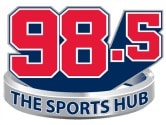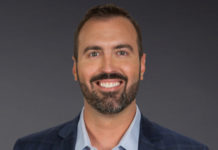
As a manager you want compelling content so if you have a sports station in your cluster you hire a knowledgeable, opinionated host who, at times, criticizes your local professional sports team, or its players. The team doesn’t really like that, it’s trying to develop a relationship with the community and sell tickets. So, what’s the happy balance? As the person in charge it’s your job to make sure both sides are happy and your hosts have the freedom to speak their mind and be real with the audience. The Sports Hub in Boston has had tremendous success walking that tightrope, in what is probably the number one sports city in the country. Mark Hannon is the Market Manager for CBS in Boston and Hannon, along with VP of Sports Programming Mike Thomas, morning hosts Toucher and Rich and PM drivers Felger and Maz are part of Radio Ink’s December 21 cover story. We spoke to all of them about creating compelling content while working closely with professional sports teams. Here’s what they had to say…
RI: Having relationships with teams and having morning shows that you want to push the line, you’re the boss, where’s the balance?
Market Manager Mark Hannon: It’s always delicate. First of all, when we launched the station, we had partnerships with both the Patriots and the Bruins. They have been tremendous partners of ours that predate the existence of the sports station. The Bruins were on WBZ-AM and the Patriots on BCN. They were obviously part of our launch, which by the way, in no small measure, was part of our success, having those two play-by-play assets. Since then, we have added the Celtics and the Revolution and that’s been really helpful to the overall product. As it relates to your question specifically, it’s a delicate balance at all times. I think our teams in Boston are very thick skinned and they understand that the sports-talk radio environment is such that these guys need to be able to critique the teams and what happens to them on the field or on the ice or on the court, they need to be able to talk about that and they need to be honest about their opinions. And sometimes those opinions are critical. I think our teams recognize that and I think as long as our guys don’t take it to levels that are outside of those boundaries, that everything remains copacetic.
RI: Do you ever get into situations where you’re letting your guys do their thing and it rubs a team or player the wrong way and you can’t get them as a guest anymore?
Program Director Mike Thomas: Yes. I think that’s something you always have to be conscious of. You have these partnerships and we always have to be aware of the partnership. But, at the same time, you’ve got to be able to go on the radio and be real, be honest, and give an opinion. If you are just a fanboy or a homer, and say there’s no way the Patriots did anything wrong, then the listeners are going to sniff that out.
RI: Have you had the situation come up a lot where you had to deal directly with a team and try to put the fire out?
Thomas: It’s always a balancing act. You have to make sure your partners are happy and that we have a good relationship. That’s ongoing no matter what the topic is.
RI: What’s the balance between you knowing you have to be critical to be taken seriously, and the fact the station has close relationships with the teams?
Felger: I don’t care about the individual interviews. We don’t do a lot of interviews on our show, because there are so few people that speak candidly in the world of sports. I don’t care about the risk of losing an interview. We only really interview one person a week anyway. Cam Neely, the Bruins president. We don’t talk to anybody else. So I don’t worry about the interview, but the thing about the rights agreements with team ownerships and our management is very real, and a real factor. There is no question about it. Because the teams are sensitive. They are too sensitive. The teams, unfortunately, put pressure on management, whether it’s radio or TV or whatever. There is pressure put at the high levels about things that are being said, and that filters down to us and so that, to me, is the real challenge between “telling it like it is” and getting a call from upstairs that says you’ve pissed somebody off and you’ve got to be careful. Walking that line. That, to me, is the most challenging part.
RI: What’s the right way to come up with something that you feel comfortable with?
Felger: Usually what’s happened is we’ve pissed somebody off and we get called into the office. We get told to knock it off and we knock it off. When my boss gives me the stop sign, I stop. I try not get called into the office, but when I do, I do as I’m told.
Mazz: It’s a balance. In some ways, having covered a beat in the past, there’s a line you have to walk when you cover a beat. So there’s some training there. But radio is very different. I would just say that if someone thinks you went too far, we try to take our medicine when it’s given. Overall, I think we’ve done a good job of that, both in terms of people inside the building and also the listeners. We try to laugh at ourselves and we try to accept our humanity, for lack of a better word, and that means making mistakes and maybe sometimes going too far and sometimes not going far enough. So again, if somebody calls you in and says, “You guys need to back off here,” then we do that. When someone calls up and tells us that we’re stupid, we laugh. Overall, I think we’re pretty good at that, but that doesn’t mean we don’t make mistakes, because we do. No matter what you do in this business, when you’re dealing with teams and people, there’s always some sort of balance and negotiating and it can be tricky sometimes.
RI: Your station has critical relationships with teams and athletes. How do you balance when you want to be critical of someone or a team, the fact that it might cause some problems in the corner office that you might have to deal with after the show?
Toucher: We are critical of teams, very much. It has never been a big issue. It’s not something that happens often.
Rich: Not to say that we haven’t gotten calls from certain owners of certain teams before. Like personal phone calls. It’s not like the owners have never heard criticism before. Especially here in Boston, it’s the most opinionated markets for sports fans. Whatever we say, they’ve got to be ready for that. Felger and Mazz take it a little more hardcore than we do. But we’ve gone off a few times. You can’t let that stop you. To be quite honest, no one has really told us not to, which I like. Mike (Thomas) and Mark (Hannon) have been really good about never telling us to not speak our minds when it comes to the local teams.
To subscribe to Radio Ink Magazine in time to receive our December 21 issue which includes an extensive interview with the team at “The Sports Hub” in Boston and radio’s top 30 local sports talkers, go HERE





